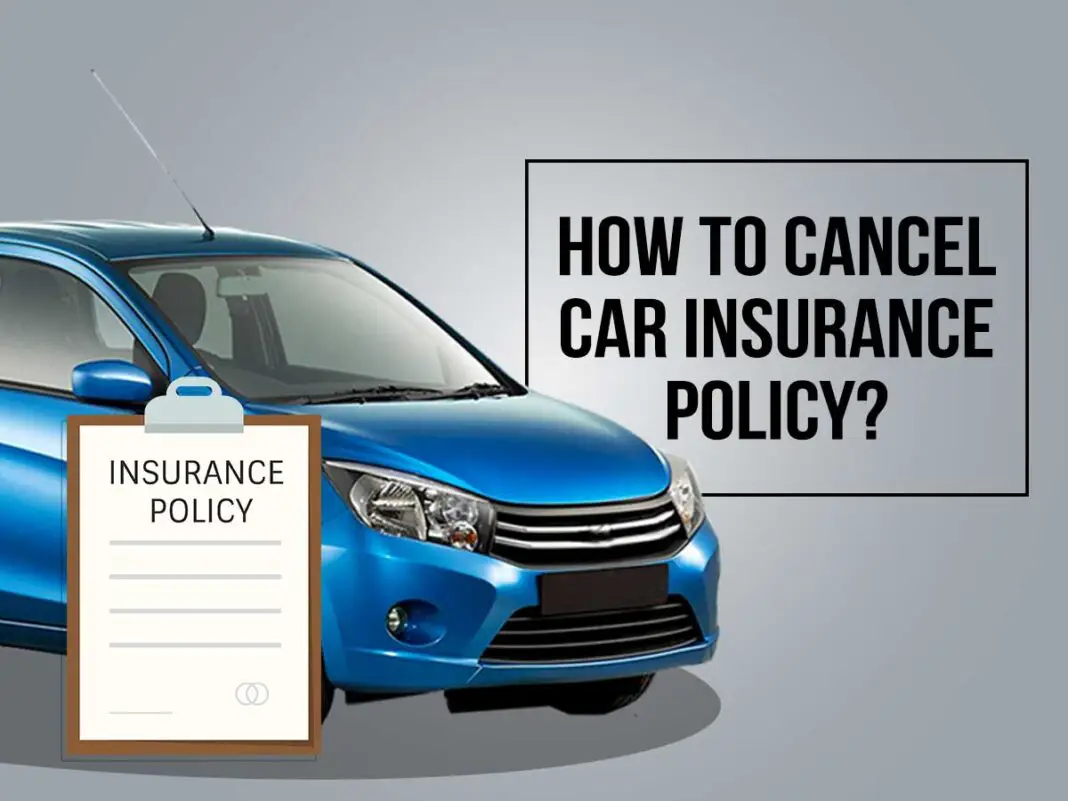“This post may contain affiliate links, if you click a link we may earn a commission if you purchase from that merchant.”
You have the option to cancel your auto insurance at any moment, but you must do so correctly. Here’s everything you need to know about cancelling your current insurance policy.
It’s simple to cancel your vehicle insurance policy, and it usually only takes a phone call to your insurer. However, there are a few things to think about before ditching your present provider: While you can cancel your auto insurance at any moment, if you’re switching insurance providers, make sure to set up your new policy first.
If you’re cancelling because you won’t have a car anymore, make sure you’re covered until you sign the title over to the new owner. You will receive a refund for your pre-paid premiums, but you may be charged a fee.
Table of Contents
Four Easy Ways to Cancel Car Insurance
It’s simple to cancel your vehicle insurance policy. The procedure of cancelling a vehicle insurance coverage for most drivers goes like this:
- Call your insurer
- Ask about the cancellation process
- Sign and send the cancellation letter, if required
- Get notice of your policy cancellation
Different insurance companies have different policies when it comes to how you should cancel your policy. Let’s take a deeper look at what each stage entails.
-
Call your insurer
The quickest approach to notify your agent that you want to cancel is to call them. Sometimes all it takes is a phone call. However, in most cases, a signature is necessary to complete the process.
It’s a good idea to call and chat with your agent if you’re switching only because of a lower price. There may be other discounts available. Alternatively, your current policy’s coverage may be changed. It’s possible that you won’t have to change companies as a result of this.
You’ll find the number on your insurance card, in your policy, or on the internet. Companies with mobile apps, such as GEICO, Progressive, State Farm, or Nationwide, are likely to include a contact option within the app.
-
Ask about the cancellation process.
Before you cancel your insurance coverage, make sure you read the fine print. When cancelling a policy, some insurance companies have specific conditions, such as:
- Cancellation fees: While many automobile insurance companies don’t impose cancellation fees, others do levy a $50 fee or a “short rate” fee, which is 10% of the remaining premium you promised to pay for the policy period. (If you signed up for a six-month policy and cancelled after three months, you’d owe 10% of the price for the remaining three months.)
- Letter of cancellation: A signed cancellation letter is required by some companies. Inquire with your carrier about the format and the address or fax number to which you should send it.
- Notice period: Some providers let you cancel right away (which you should only do if you have new coverage coming soon), while others require 30 days’ notice.
-
Sign and send the cancellation letter, if required.
If your insurance company demands a cancellation letter, you’ll need to do this step. If you’re switching vehicle insurance carriers, be sure you have new coverage in place that begins on or before your current policy’s expiration date. You should make sure that your old policy expires on the same day that your new one starts.
-
Get notice of your policy cancellation.
This indicates that your policy has been officially cancelled. This is also when you’ll get a refund of any pre-paid premiums, excluding any required fees.
See also: Best Auto Insurance Companies of 2021
What happens if you just stop paying your car insurance premiums?
Your auto insurance will be terminated if you stop paying for it, but we don’t encourage this as a way of cancellation. For one reason, your vehicle insurance provider won’t know you’re planning to cancel, so they’ll ask for payments within your grace period (the time you have to pay any outstanding premiums before your policy is cancelled). You’ll be charged during the grace period, which usually lasts a few weeks after your account is cancelled.
There is one exception: if your insurance does not automatically renew, you can stop paying at the end of the term with no consequences.
Can you cancel your insurance policy at any time?
You can terminate your auto insurance at any time, and any “unused” charges will be returned. However, as previously stated, if you cancel by not paying, you may be charged during the grace period. If you’re switching vehicle insurance carriers, the end date of your previous policy and the start date of the new one must coincide by at least one day.
Because most plans begin and expire at 12:01 a.m., if you end one on Monday and start another on Tuesday, you will be without coverage from 12:01 a.m. Monday to 12:01 a.m. Tuesday, leaving you uninsured for a full day.
Because anything can happen in a day, don’t allow any gaps in your policies. You could face harsh consequences if you’re discovered driving without insurance, and if your car is damaged in an accident, you’ll have to pay for the repairs yourself.
If you’re cancelling your insurance because you’re selling your car, the same regulation applies. Allow the insurance to expire the day after you plan to drive the car for the last time.
When is cancelling your car insurance a good idea?
The only time you should cancel your automobile insurance is if you’re transferring policies or getting rid of your vehicle. If you plan on renting or borrowing a car regularly, you should consider non-owner car insurance.
When is cancelling your car insurance a bad idea?
People sometimes wish to cancel their automobile insurance because they believe they no longer require it. However, if you want to keep your car but drop your insurance, you should think twice. Here are several situations where cancelling your auto insurance policy is not a good idea:
-
Cancelling car insurance because you’re moving to a state that doesn’t require car insurance.
Car insurance is required in almost all states. Only Virginia and New Hampshire are the only states in the United States that do not require vehicle insurance. It may be tempting to terminate your insurance policy if you move to one of these states. But just because it’s not required by the state doesn’t mean it’s any less vital, especially if you’re responsible for someone else’s hospital or repair shop fees.
See also: Is My Car Insurance Covered in Other Countries?
-
Cancelling car insurance because you barely drive.
Even if you don’t drive often, you need insurance because it’s not only the law in practically every state, but it’s also a necessary kind of financial security. If you don’t drive very much, you may be eligible for auto insurance discounts. Make sure to check with your insurance company.
-
Cancelling car insurance because your car is in storage.
It may be tempting to cancel your auto insurance if your car is in a garage for an extended length of time due to a long trip or a military deployment, but you should keep the coverage. For one thing, even if you aren’t driving your automobile, it must be insured if it is registered. Even if your automobile is in a garage, you should keep it safe in case of a fire or falling objects.
For one thing, even if you aren’t driving your automobile, it must be insured if it is registered. Even if your car is in a garage, you should keep it safe in the event of a fire, falling debris, or severe weather. Instead of cancelling your policy, consider reducing your coverage to only comprehensive coverage.
Maintaining auto insurance coverage is also vital to avoid having a lapse in your insurance history. If you cancel your policy because you’re out of the country or don’t drive often, insurers may detect a gap in your previous coverage history when you reapply. This may result in an increase in your premiums and a financial loss.


































